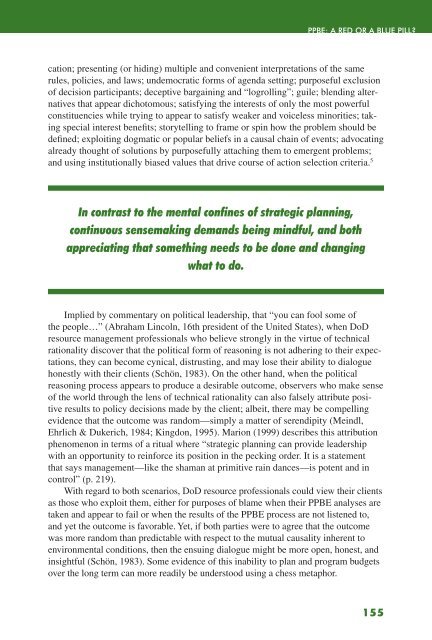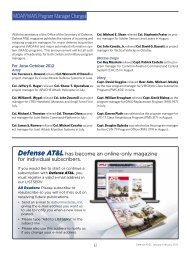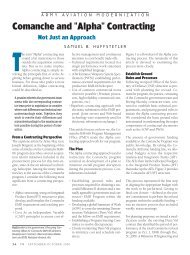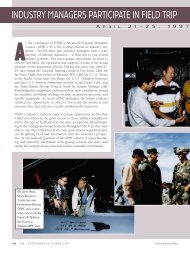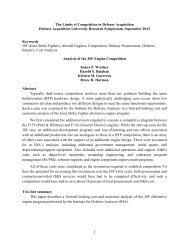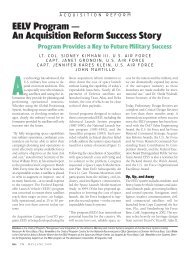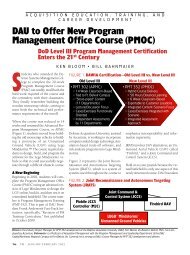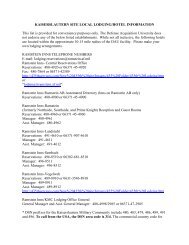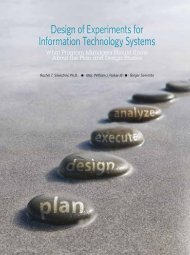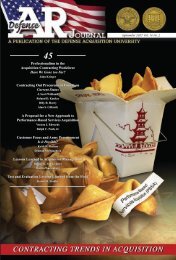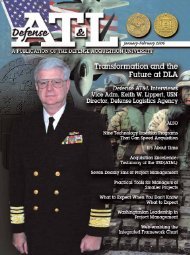Defense ARJ - Defense Acquisition University
Defense ARJ - Defense Acquisition University
Defense ARJ - Defense Acquisition University
Create successful ePaper yourself
Turn your PDF publications into a flip-book with our unique Google optimized e-Paper software.
PPBe: a reD or a Blue Pill?<br />
cation; presenting (or hiding) multiple and convenient interpretations of the same<br />
rules, policies, and laws; undemocratic forms of agenda setting; purposeful exclusion<br />
of decision participants; deceptive bargaining and “logrolling”; guile; blending alternatives<br />
that appear dichotomous; satisfying the interests of only the most powerful<br />
constituencies while trying to appear to satisfy weaker and voiceless minorities; taking<br />
special interest benefits; storytelling to frame or spin how the problem should be<br />
defined; exploiting dogmatic or popular beliefs in a causal chain of events; advocating<br />
already thought of solutions by purposefully attaching them to emergent problems;<br />
and using institutionally biased values that drive course of action selection criteria. 5<br />
In contrast to the mental confines of strategic planning,<br />
continuous sensemaking demands being mindful, and both<br />
appreciating that something needs to be done and changing<br />
what to do.<br />
Implied by commentary on political leadership, that “you can fool some of<br />
the people…” (Abraham Lincoln, 16th president of the United States), when DoD<br />
resource management professionals who believe strongly in the virtue of technical<br />
rationality discover that the political form of reasoning is not adhering to their expectations,<br />
they can become cynical, distrusting, and may lose their ability to dialogue<br />
honestly with their clients (Schön, 1983). On the other hand, when the political<br />
reasoning process appears to produce a desirable outcome, observers who make sense<br />
of the world through the lens of technical rationality can also falsely attribute positive<br />
results to policy decisions made by the client; albeit, there may be compelling<br />
evidence that the outcome was random—simply a matter of serendipity (Meindl,<br />
Ehrlich & Dukerich, 1984; Kingdon, 1995). Marion (1999) describes this attribution<br />
phenomenon in terms of a ritual where “strategic planning can provide leadership<br />
with an opportunity to reinforce its position in the pecking order. It is a statement<br />
that says management—like the shaman at primitive rain dances—is potent and in<br />
control” (p. 219).<br />
With regard to both scenarios, DoD resource professionals could view their clients<br />
as those who exploit them, either for purposes of blame when their PPBE analyses are<br />
taken and appear to fail or when the results of the PPBE process are not listened to,<br />
and yet the outcome is favorable. Yet, if both parties were to agree that the outcome<br />
was more random than predictable with respect to the mutual causality inherent to<br />
environmental conditions, then the ensuing dialogue might be more open, honest, and<br />
insightful (Schön, 1983). Some evidence of this inability to plan and program budgets<br />
over the long term can more readily be understood using a chess metaphor.<br />
1 5 5


